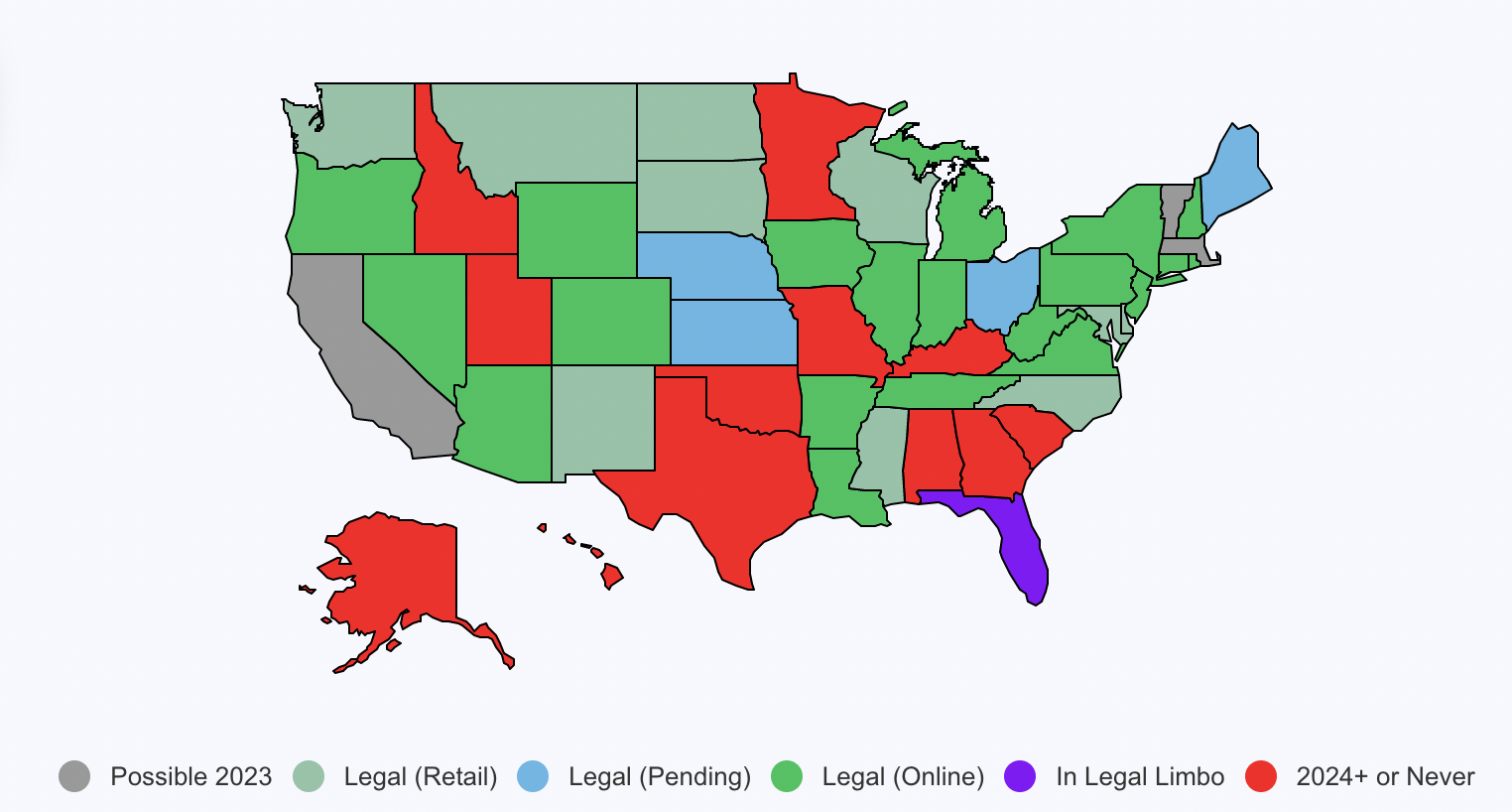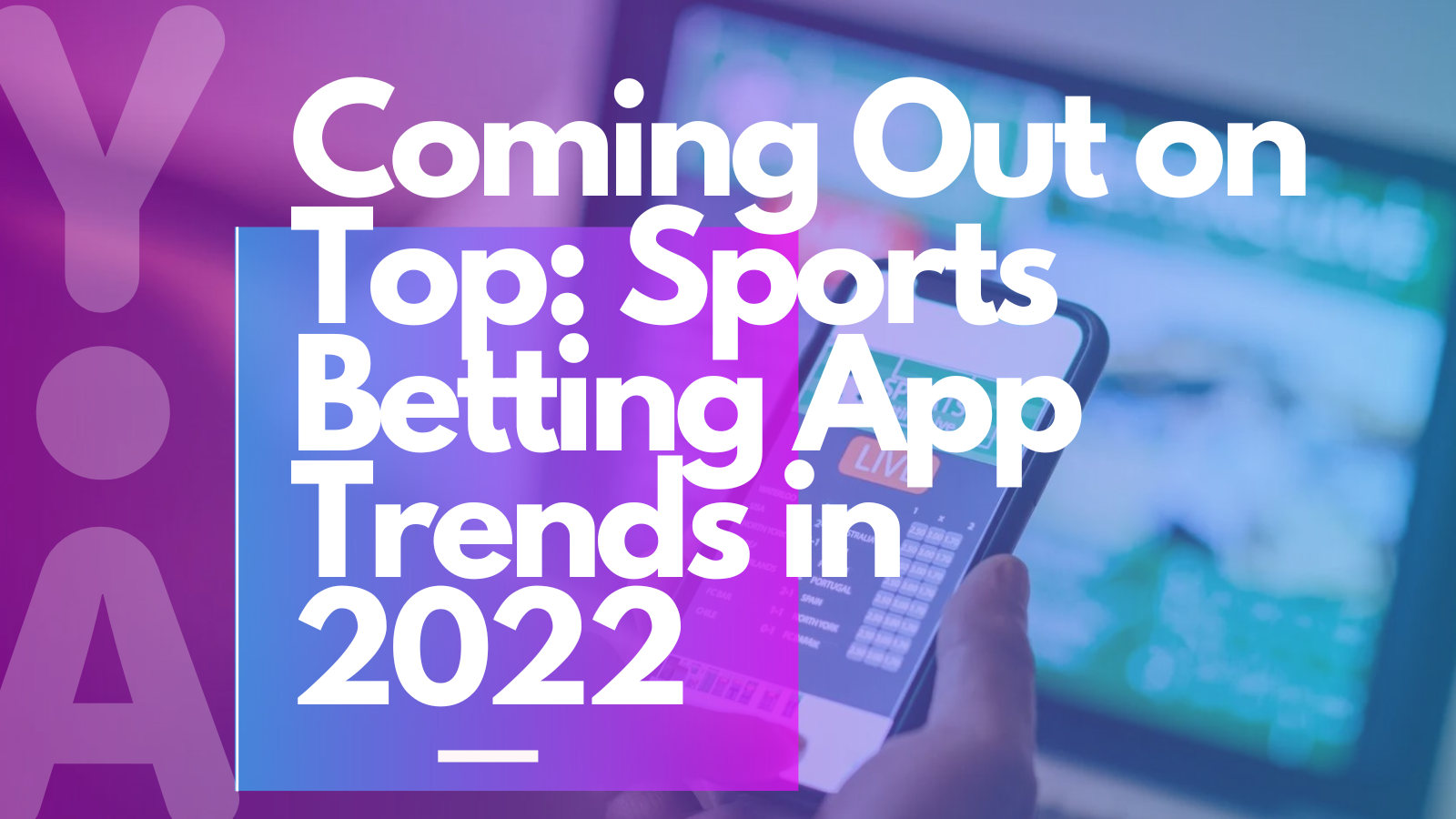Sports have been the center of American life for decades. From cheering on your college alma mater to rooting for your favorite Major League Baseball team, sports can build community and inspire all encompassing loyalty. Sports betting comes naturally as a result of the massive following and allegiance that fans have to their favorite teams.
What started as horse-betting in the early 19th century has turned into a multi billion dollar industry. Today, the global sports betting market is expected to grow from $89.65 billion in 2021 to $99.20 billion in 2022 at a compound annual growth rate of 10.64%. In 2026, the sports betting market is expected to reach an astounding $144.34 billion. The pandemic has had an extremely positive impact on this industry as consumers turned to their mobile devices to feed their social, financial and psychological needs during lockdowns.
With the massive growth of sports betting apps in recent years, new trends are emerging to take these platforms to the next level and appeal to new users in the age of smartphones and fast-paced environments. App marketers can help retain users as well as gain new ones by staying on top of the ever-changing landscape that is sports betting.
Trends of Sports Betting Apps
Sports betting these days looks a lot different than it did 20 years ago. You no longer have to go in-person to a game or a racetrack to place your bets on the team you’ve researched thoroughly. Sports betting has turned into a more technological and modern process with crypto and AI being at the forefront of these trends.
Use of Crypto
Sports betting with Bitcoin was one of the first use cases for cryptocurrencies that caught on. Because of online and mobile gambling restrictions in countries like the United States, many users were forced to use crypto-friendly sports betting apps if they wanted to gamble on national sporting teams. Cryptocurrency betting sites quickly realized that the key to success in the era of smartphones was to create their own sports betting apps in order to expand further to their target audience.
Many sports betting apps have incorporated crypto options into their payment options to attract younger, tech-savvy users. The appeal of using blockchain technology for betting purposes gives users a sense of security, performance and flexibility within the app. The immutability of the blockchain ensures the betting activities' transparency. Betting doesn't have to be done through a single entity anymore because of the decentralization of data, which means that there is no longer a problem with data integrity in the betting platform.
Microbetting
A main draw for users to use apps as their main betting platform has to do with microbetting. Microbetting means betting on individual moments in a game that are not related to the final score. Microbetting happens in real-time as the game progresses, which is why apps work so well with this type of bet. Users can have their phones out while the game is taking place and make wagers on an individual pitch or field goal.
It is estimated that there will be more than $9 billion per year spent on U.S. sports betting by 2025, with almost $7 billion of that on in-play betting and micro-bets. Micro-betting will usher in a new era of sports betting and have a profound impact on the sports ecosystem more broadly. The speed and instant-gratification that comes with microbetting makes it very appealing to Gen-Z users who may just be getting started with sports betting apps. Making sure that your app is conducive to these sort of bets will make them all the more attractive to new users.
Tapping into AI
Just like many other industries, sports betting apps are seeing huge opportunities with the use of artificial intelligence (AI). Because there are such large volumes of sports statistics readily available, AI is an ideal tool for analyzing data trends in games and forecasting outcomes. Gamblers now have access to predictive analytics of players’ health and game statistics before they place their bets. The increased access to knowledge makes sports betting a more enticing activity for newcomers.
Trend prediction aside, AI has many other uses when it comes to sports betting apps – specifically when it comes to customer experience. With the rise in popularity of these platforms, it is more important than ever for apps to stand out amongst their competitors. AI will help to make adjustments to the customer experience by tailoring messaging to users, removing irrelevant information and supporting a more recreational betting experience. AI can also provide simple instructions to newer users so that they don’t feel overwhelmed when entering this new world of mobile betting. These capabilities drive for personalization, which is a key lever sports betting apps can use to retain their loyal users.
Looking Forward
While sports betting apps have been around for quite some time, this space is fast-paced and ever changing. The past few years have brought out many changes in the industry that marketers need to pay attention to in order to win the loyalty of their users.
Rise of Female Users
The typical image of a sports gambler has changed over the years. In 2021 alone, more than 4.6 million women joined sports betting apps in the United States – a 115% increase in the number of women users compared with 2020. Even though the number of men on these platforms still outweighs the number of women by around 250%, the growth rate of women entering this space nearly doubles that of men at 63%. Popular sports betting apps such as FanDuel and DraftKings can attest to this growth with FanDuel bringing in an estimated 1.7 million female customers last year and DraftKings with around 900,000.
With this shift in demographic of users, there is an opportunity for apps to showcase their versatility and inclusivity of all genders. Tailoring messaging to newer women users, encouraging them to stay on your app will generate stronger relationships. Take advantage of AI technology to generate personalized messages to these new female users to help them navigate the app.
Changing Legal Landscape
The legality of sports betting apps is still a highly polarizing subject. Some states, such as Nevada and New Mexico, have allowed sports betting for years, whereas Maine and Kansas only just legalized these types of online interactions earlier in 2022. States also vary on the type of betting that they allow. For example, in places like Delaware, while in-person betting is legal, games involving in-state college teams are restricted.
Sports betting app marketers that wish to be successful in this space need to have a strong understanding of the changing legal policies that come with placing online bets. Pushing campaigns in states that find sports betting frowned upon could lead to a poor brand image for your app and a loss of consumer trust. In addition, targeting states that only allow mobile betting rather than in-person (ie. New Hampshire) will be most beneficial in attracting users that are not only interested, but need to use an app in order to be involved with this sport.

Source: Action Network
Sports Betting App Takeaways
What started out in the early 19th century with betting on horses has turned into a multi billion dollar industry today. The global sports betting market is expected to grow from $89.65 billion in 2021 to $99.20 billion in 2022. New trends are emerging to take these platforms to the next level and appeal to new users in the age of smartphones and fast-paced environments. App marketers can help retain users as well as gain new ones by staying on top of the ever-changing landscape that is sports betting.
Trends in Sports Betting Apps
- Use of Crypto - Sports betting with Bitcoin was one of the first use cases for cryptocurrencies that caught on. Many have incorporated crypto options into their payment options to attract younger, tech-savvy users. The appeal of using blockchain technology for betting purposes gives users a sense of security, performance and flexibility within the app.
- Microbetting - Microbetting means betting on individual moments in a game that are not related to the final score. It is estimated that there will be more than $9 billion per year spent on U.S. sports betting by 2025, with almost $7 billion of that on in-play betting and micro-bets. Micro-betting will usher in a new era of sports betting and have a profound impact on the sports ecosystem more broadly.
- Tapping into AI - Just like many other industries, sports betting apps are seeing huge opportunities with the use of artificial intelligence (AI). AI is an ideal tool for analyzing data trends in games and forecasting outcomes as well as developing automated and personalized messaging for users in the app.
Looking Forward
- Rise of Female Users - The typical image of a sports gambler has changed over the years. In 2021 alone, more than 4.6 million women joined sports betting apps in the United States – a 115% increase in the number of women users compared with 2020. With this shift in demographic of users, there is an opportunity for apps to showcase their versatility and inclusivity of all genders.
- Changing Legal Landscape - The legality of these apps is still a highly polarizing subject. Sports betting app marketers that wish to be successful in this space need to have a strong understanding of the constantly changing legalizations that come with placing online bets.
Want to learn more about growth in sports betting? Chat with one of our marketing experts here!

